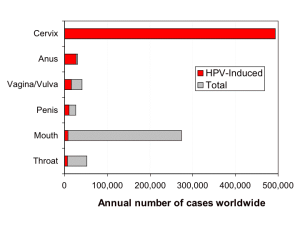The human papilloma virus (HPV) is the most common sexually transmitted infection (STI) in the world with around 75% of Canadians will be infected with HPV at some point in their life time. HPV is only capable of infecting the skin or mucous membranes of the body, including the airways, genitals, mouth and eyes. While most HPV infections don’t result in any outward symptoms, some people can develop warts, the type of which varies on the type of HPV contracted. Warts, however, are not the reason doctors and researchers are concerned with HPV infections. Recent research has shown that 5% of new cancers are caused by HPV infections, resulting in 560,000 new cancers per year. Two strains of the virus, HPV-16 and HPV-19, are associated with 99.7% of all cervical cancers. HPV is also associated with cancers of the anus, vagina, penis, mouth and throat. The high association between these cancers and HPV means that if we could find a way to prevent HPV infection, we should be able to greatly reduce the incidence of these cancers, especially cervical cancers. In fact, HPV vaccines are predicted to reduce the incidence of cervical cancers by 87%.
The thing about the HPV vaccine is they have little benefit to women (or men) who have already been infected with the virus. So they need to be administered to people who have yet to engage in sexual intercourse and therefore are unlikely to have come in contact with HPV. The need to vaccinate at an early age is fuelling a heated debate in the US and parts of Canada as parents fear the vaccine will lead to young women and men participating in risky sexual behaviours. They fear that a sense of STI immunity will come to those who are protected against HPV and promiscuity will reign supreme, well a new study out of Canada shows that this is not the case.
The study, published in the Canadian Medical Association Journal, looked at over 260,000 girls in Ontario, monitored them to their grade 12 year and compared the rates of pregnancy or STI’s in the girls who received the HPV vaccine as part of a school based HPV vaccination program (128,712 girls in total) to the girls who had never received the vaccine because the program hadn’t been initiated yet (131,781 girls total). What they found was that the girls who had received the HPV vaccine were no more likely to get pregnant than the girls who hadn’t received the vaccine. They also saw that the girls who had received the vaccine were also no more likely to contract other STIs. Both of these results suggest that the girls who were using the vaccine were not engaging in riskier sexual intercourse or being more promiscuous.
While we wait on results for how effective the HPV vaccine is at preventing cancer in women and men, the background data suggests we should see a significant protective effect if this program is accepted universally. There is also a movement aiming to get the vaccine available for boys for free. Currently, the vaccine is only available to young girls for free even though we know men are often infected by HPV and can be carriers of the virus. The science behind the vaccination program is sound and it would greatly reduce the burden of cancer. So get your children vaccinated against HPV to protect them from cancer in the future.




